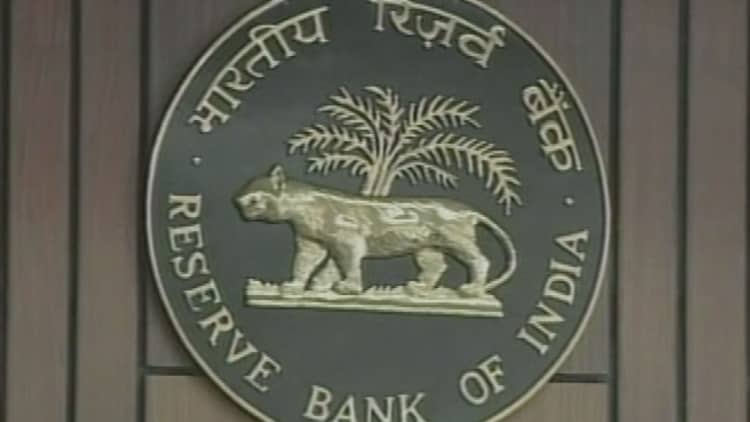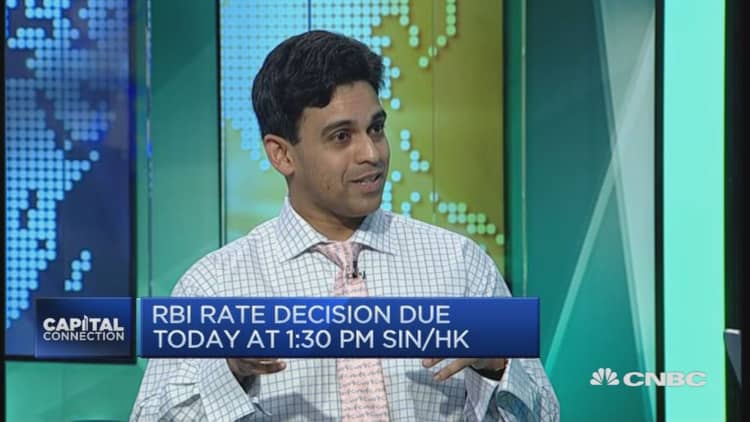
In its last meeting under the helm of Governor Raghuram Rajan, the Reserve Bank of India (RBI) left monetary policy steady on Tuesday, as widely expected.
The RBI left the repo rate and reverse repo rate unchanged at 6.5 percent and 6 percent, respectively, adding that policy would remain "accommodative" and that it was "awaiting space for policy action."
Indian stocks and the rupee were both modestly lower following the decision.
It's all about inflation
The space that the RBI was referring to was widely believed to be inflation.
Stubbornly high food prices in recent months led the bulk of analysts to believe the central bank would stay on hold for the second straight time; June's meeting saw Rajan leave rates unchanged following a 25 basis point cut in April. Since January 2015, the RBI has lowered its policy interest rate by 150 basis points, according to Mizuho Bank.
June's annual consumer price inflation (CPI) rate—the latest available—rose to 5.77 percent, up from May's 5.76 percent and April's 5.39 percent, and marked the fastest pace of price increase since August 2014.
That doesn't bode well for Prime Minister Modi's administration, which last week formally implemented an inflation target of 4 percent for the next five years, supporting Rajan's goal to keep inflation below 5 percent by March 2017.
But the RBI flagged on Tuesday that there were "upside risks" to that 5 percent target.
For now, the central bank struck a calm tone regarding food prices, citing the monsoon's steady progress as a key reason. For the week that ended August 3, monsoon rains were 6 percent above average, according to the weather office, indicating a bumper agricultural crop. Indian farmers rely heavily on rains as irrigation infrastructure in the country remains creaky.

But the central bank warned that core inflation, which excludes food and fuel, could see volatility ahead. "If the current softness in crude prices proves to be transient and as the output gap continues to close, inflation excluding food and fuel may likely trend upwards and counterbalance the benefit of the expected easing of food inflation," the RBI said in a statement.
Despite recent increases in CPI, HSBC believed further rate cuts were on the table.
"Beyond the August meeting, we expect the RBI to cut the policy repo rate by 25 basis points in Q4, if rains remain strong. This final cut is in line with the RBI's preferred real rate range of 1.5 - 2 percent. With this, the RBI would have delivered 175 basis points in rate cuts and we do not see space for more, given most drivers of disinflation have played out their parts over the last 18 months and only hard work via structural reforms can lower inflation from here on," the bank said in a note ahead of the policy outcome.
The central bank noted that the landmark Goods and Services Tax (GST) bill would raise returns to investment across various economic sectors and strengthen government finances.
Rajan did not believe GST implementation would push up inflation, calling it a "one-time adjustment" instead. Officials will need to monitor the impact so the adjustment doesn't become generalized inflation, he said.
Regarding gross domestic product, the RBI maintained its projection of 7.6 percent growth for 2016-17. Higher rural demand thanks to the monsoon as well as increased consumption from the higher salaries recommended by the Seventh Pay Commission would bolster momentum, it added.
Rajan's legacy
Because Tuesday's move was widely priced into markets, many economists believed markets were likely to place greater focus on Governor Rajan's post-decision commentary, especially as to who his successor will be.
"While there is little clarity on who the next Governor will be or the policy committee members (beyond speculation) are, expectations for a dovish successor have spurred markets in recent weeks," said DBS economist Radhika Rao.
Among his numerous achievements, the 53 year old will perhaps be most remembered for his efforts to clean up bad loans in public sector banks and stabilize the rupee.
"Rajan has left a remarkable legacy for India. I don't think any central bank governor has made such an impact in such a short span of time," noted Nandita Parker, founder and managing partner at Karma Capital Management.

